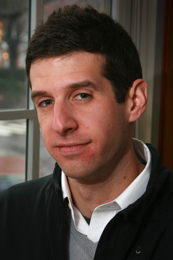
Garwood was shocked when a student in his 10th grade English class suddenly picked up a chair and threw it against the wall.
“I think everyone thinks that teaching is easy,” Garwood said.”They think ‘Oh I can do that. I could be a teacher.’ Teaching is a very demanding thing.”
In that upsetting moment Garwood began to more fully appreciate the importance of maintaining effective control of a classroom. Teachers with undeveloped classroom management skills struggle. They are more likely to become frustrated. Many become so discouraged that they quit teaching after just a few years.
It’s become Garwood’s research focus as a Ph.D. student at the School of Education.
‘A little bit of structure’
Classroom management, Garwood says, is everything a teacher does besides giving instruction. This can include everything from building relationships and providing emotional support to simply organizing the classroom.
A third-year doctoral student, Garwood recently won the Wilson M. and Anne Brown Award to help him pursue his research.
Garwood said that behavior management is just one part of successful classroom management.
“Whether they are 1st graders or seniors in high school they want a little bit of structure,” he said.
The biggest part, Garwood said, has to do with the relationships between the teachers and students, and this is where his research interests lie.
Garwood’s research is looking at how teachers can more effectively make connections with their students that will, in turn, help sustain a successful classroom environment. Garwood is hoping that his findings will give teachers tools to be more successful, enabling them to more fully enjoy their work and to remain in the field longer.
Garwood’s research is using data from the Family Life Project, which has been following a group of children born in 2002 in rural settings, seeking to understand family, community, economic and parent-child relationships and how they influence the children’s development.
Garwood is looking closely at how classroom management differences have affected the students in terms of reading achievement, engagement in school and in overall academic success.
Garwood said that there are so many studies that focus on poverty’s impact on education in urban areas. However, there are proportionally more poor children in rural areas than in urban ones.
“There are lots of kids in rural areas that need help as well,” he said.
Garwood hopes his research will provide teachers with the tools they need to build effective classroom communities.
Becoming an Educator
Garwood began his undergraduate education at the State University of New York at Brockport with the intention of becoming a lawyer. Working in education was the last place he thought he would end up. He had even been accepted to law school at Gonzaga University and was planning on moving to Washington after graduation.
Then at the last second he decided not to go to law school. He changed his mind – and his life.
“I just wasn’t passionate about it,” he said,”I didn’t feel excited.”
As an undergraduate, he had taught as a substitute teacher to earn extra money for law school.
“I never looked at it as a profession,” he said. But as he was about to leave for law school he realized that teaching was exactly what he wanted to do. He changed his plan to pursue education.
“Working with young people is something that I’ve always really enjoyed,” he said,”I just like helping people and seeing people succeed.”
From Brockport where he obtained his bachelor’s degree he went to Vanderbilt University where he got his teaching license and his master’s degree in secondary education. Then he came to UNC where he is in the early childhood, special education, and literacy Ph.D. specialization area.
“I left teaching because I wanted to come back and study this thing that I felt was a key tool to surviving in the classroom,” he said.
In addition to his dissertation research, Garwood works as a research assistant in faculty member Lynne Vernon-Feagans’s Targeted Reading Intervention program. The project uses webcam coaching in rural schools to coach teachers through literacy lessons with students and measure student improvement.
Garwood said the research inspired him because it specifically deals with students and classrooms in rural areas.
“I’m from a small town and I worked in a small town, so I’ve always enjoyed working in small-town schools,” Garwood said.
Garwood also works as an academic coach at the Learning Center on campus. There, he helps undergraduate students with things like time management, stress management and study tools.
“Really, my role as an academic coach is to help them navigate college life, because it isn’t the easiest thing for a lot of people,” he said.
After graduation, Garwood wants to work as a professor in a school of education, continuing his research and working with students who are going to be leading classrooms.
Despite the intense workload, Garwood loves what he does.
“I know that it was the right choice because you couldn’t survive this process without a passion for it,” he said.